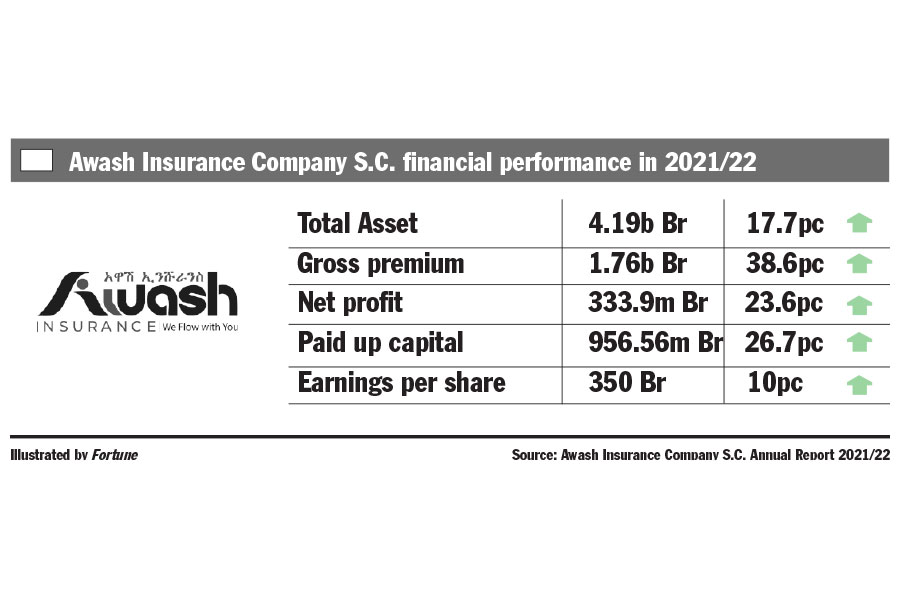
Fortune News | Sep 21,2025
Oct 19 , 2019
By Asseged G. Medhin
Changes in economic policy, regulations and the dynamics of growth in the continent in general and the eastern corridor, in particular, are undergoing significant transformation. Many things in the Ethiopian business landscape are also changing. The insurance industry is no exception.
The nature of risk and its mitigating factors are highly variable these days. The total volume of premiums generated by insurers is increasing, and the impact on investment is becoming more attractive. The amount is expected to increase significantly during the coming year, and the rate of growth is continuing to be positive. However, the share of the Ethiopian insurance market in the economy is still low compared with neighbouring countries in East Africa.
Some experts attribute the latent growth of the sector to policymakers, who they say do not understand the importance of the sector. While others shift the blame to the regulatory body, which they claim fails to regulate the sector adequately. The big question is, how will this sector fare in the face of the inevitable opening up of the economy?
The gradual but steady shift in the structure of the economy and the attempt at modernisation, which was the opportunity for the service sector in general and the insurance sector, in particular, have not been fully utilised so far. The new government policy direction is still promising for insurers and financiers if they take advantage of it.
To do that the insurance industry in Ethiopia has to get out of muddling in traditional business practices that lack extensive knowledge of insurance and exposure of emerging risk. The nature of unhealthy competition between and among insurers will no longer serve the insurance industry. Techniques of risk assessment, pricing, adequacy of capital and reinsurance treatment need to take proper structure following the change in the continent and as economic reform comes across each sector and insurance is not exempted.
Insurers are urged to design their marketing strategy in two ways. One option is aggressive marketing, integrating the law of large numbers whereby the large size of premiums absorbs fixed costs in the short run and reduces variable costs per policy. This traditional model has served the sector for more than three decades. The problem is the growth of the inflation rate significantly challenged the sector in the claims management process. The impact is felt in both actual claims paid and loss reserve.
The second strategy in an oligopoly market (few suppliers/insurers) with risk selection. This has a counter effect in the growth of written premiums, significant profit and market share. This also serves insurers to track business in the oligopoly market. Rival insurers especially set their strategy toward being selective in writing policies. But when insurers settle reported claims and maintain adequate loss reserves, a higher inflationary situation, the approach may result in a loss.
The Ethiopian insurance sector has no proper adjustment system, since there is no adequate scientific data respective to insurance policies and the impact of inflation on determining price equivalent with commensurate or associated risk.
The need to adjust the premium rate on the marginal rate of inflation and prompt claims settlement is highly recommended for such a market. However, it is becoming outdated as the change in the economy demands endless innovational products, and the insurer has to seek the best strategy of profitability.
The longer claims cycle with low investment option and lower premium rate with higher inflation leaves the book for little profit or bankruptcy that will aggravate stakeholder’s dissonance.
The higher the written premium grows with a higher market share and relatively higher profitability or incremental profit is far better than tapping the same growth, profit and market share using a risk selection strategy in an inflationary situation and with inefficient claims service.
Sticking to the traditional market means taking the loss-making option where everything is inefficient due to the lack of aggressive information technology and corrupted practices emanating out of passive responses to urgent business queries.
The Ethiopian economy is becoming attractive for foreign investors because of the recently issued Homegrown Economic Reform Agenda. Businesses that are following the old traditional business models may have a maximum of two years left before they either change their strategy or disappear from the scene. Judgment day is approaching, and every insurance company has to revise their strategy to meet the urge of shareholders' increased appetite for dividends, survival, mergers and acquisitions. It is inevitable that the sector will no longer remain closed eternally.
Some international reports show that Africa is the next frontier, with the higher acquisition of talent and technology from the rest of the world. The strategy the government is trying to implement is all about increasing the capacity of homegrown firms before they are washed away by globalisation. The role Ethiopia is playing in the economy of East Africa demands fundamental change in financial sector regulation, particularly the insurance industry, which has been disregarded in every economic reform so far.
The notion of the change is clear that insurers should have proper risk regulation and adequate capital. They need to immediately be engaged in innovation, acquire international skills, have knowledge-based leadership and design proactive corporate strategies with worst case scenarios like mergers and acquisitions in mind. A modern strategy of innovation, talent acquisition and diversified products can fit with that of the upcoming demand. These will guarantee the survival of the business and increase the return on investment.
PUBLISHED ON
Oct 19,2019 [ VOL
20 , NO
1016]


Fortune News | Sep 21,2025

Featured | Sep 23,2023

Radar | Jan 09,2021

Fortune News | Jun 10,2023

Viewpoints | Jan 07,2023

Photo Gallery | 175102 Views | May 06,2019

Photo Gallery | 165327 Views | Apr 26,2019

Photo Gallery | 155616 Views | Oct 06,2021

My Opinion | 136774 Views | Aug 14,2021

Dec 22 , 2024 . By TIZITA SHEWAFERAW
Charged with transforming colossal state-owned enterprises into modern and competitiv...

Aug 18 , 2024 . By AKSAH ITALO
Although predictable Yonas Zerihun's job in the ride-hailing service is not immune to...

Jul 28 , 2024 . By TIZITA SHEWAFERAW
Unhabitual, perhaps too many, Samuel Gebreyohannes, 38, used to occasionally enjoy a couple of beers at breakfast. However, he recently swit...

Jul 13 , 2024 . By AKSAH ITALO
Investors who rely on tractors, trucks, and field vehicles for commuting, transporting commodities, and f...

Oct 18 , 2025
The political establishment, notably the ruling party and its top brass, has become p...

Oct 11 , 2025
Ladislas Farago, a roving Associated Press (AP) correspondent, arrived in Ethiopia in...

Oct 4 , 2025
Eyob Tekalegn (PhD) had been in the Governor's chair for only weeks when, on Septembe...

Sep 27 , 2025
Four years into an experiment with “shock therapy” in education, the national moo...

Oct 18 , 2025 . By NAHOM AYELE
In a sweeping reform that upends nearly a decade of uniform health insurance contribu...

Oct 18 , 2025 . By BEZAWIT HULUAGER
A bill that could transform the nutritional state sits in a limbo, even as the countr...

Oct 18 , 2025 . By SURAFEL MULUGETA
A long-planned directive to curb carbon emissions from fossil-fuel-powered vehicles h...

Oct 18 , 2025 . By BEZAWIT HULUAGER
Transaction advisors working with companies that hold over a quarter of a billion Bir...